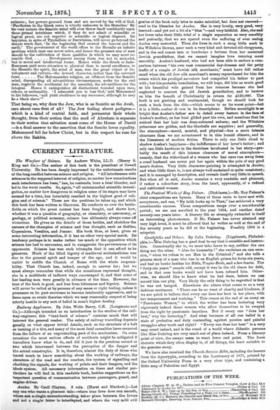Azalea. By Cecil Clayton. 3 vols. (Hurst and Blackett.)—Let any
one who wants a pleasant tale—where true love does run smooth, where.aot. &single misunderstanding takes place between the lovers and not a single letter is interdepted, and where the very mild evil
genius of the book only tries to make mischief, but does not succeed— send to the libraries for Azalea. She is very lovely, very good, very learned—and yet not a bit of a " blue "—and very faithful. Also, she and her lover take their little trial of a single separation so very sensibly and patiently, that we are spared even the suffering of ever seeing Azalea very sorrowful. Then she lives in such a snug little nook in the Wiltshire Downs, near such a very kind and devoted old clergyman, and in the end comes into so handsome a fortune from her maternal Jewish grandfather, that we cannot imagine love running more smoothly. Azalea's husband, who had not been able to endure a com- parison between "his own vast commercial day-dreams and the petty traffic of a couple of Jewish silk merchants," must have felt rather small when the old Jew silk merchant's money repurchased for him the estate which his prodigal ancestors had compelled his father to part with ; but his probable humiliation, we will hope, did him as much good as his beautiful wife gained from her remorse because she had neglected to convert the old Jewish grandfather, and to bestow on him the benefit of Christianity in return for £120,000. The book is not gushing and sentimental, though we should look for such a book from the title—which seems to us its worst point—but it is a little couhur de rose in its descriptions. Italian moonlight is sa bright that Azalea's father saw in detail every feature in the face of Azalea's mother, as her boat glided past his own, and mentions that ha noticed that her hair was deep-coloured auburn; and the Wiltshire primroses are golden, and the bluebells are sapphire; and generally, the atmosphere—moral, mental, and physical—has a more intense clearness than we aro accustomed to in this humid climate, and in the literature of modern fiction. There is only one little cloud to shadow Azalea's happiness—the indifference of her lover's father ; and only one little hardness in the doctrines inculcated in her story—pro- bably the result of this intense clearness of moral atmosphere— namely, that the widowhood of a woman who Ilse once run away from a cruel husband can never put her again within tbo pale of any good man's desires. Very little character-painting is attempted in Azalea, and what little there is, is not always well sustained or quite consistent ; and it is managed by description, and reveals itself very little in speech. Bnt when all is said, Azalea remains a very readable and pleasant, if rather a colourless story, from the hand, apparently, of a refined and cultivated woman.
































 Previous page
Previous page